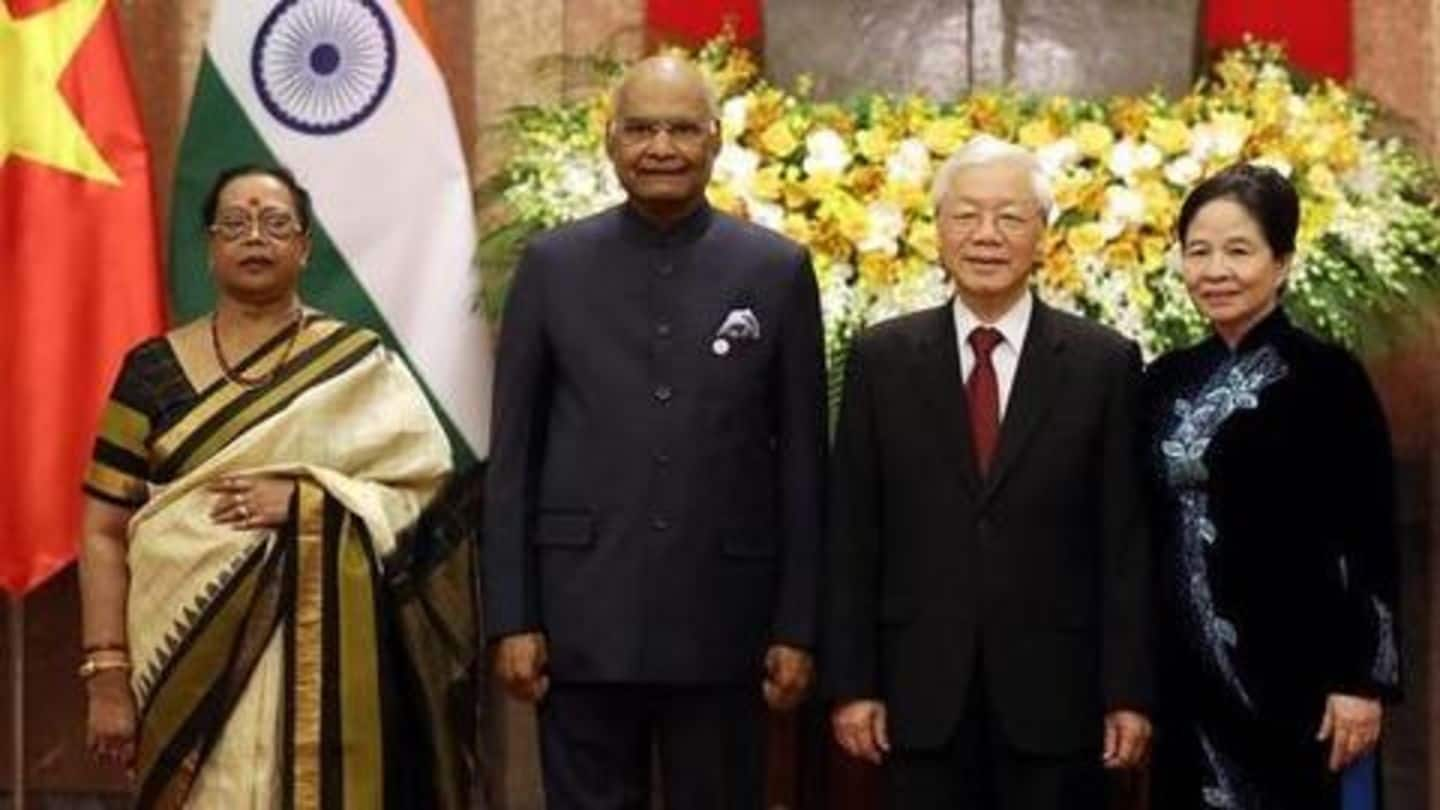
India and Vietnam to step up defense cooperation, oil exploration
What's the story
India and Vietnam have decided to step up defense cooperation and oil exploration to boost their bilateral ties as they reaffirmed the importance of freedom of navigation and unimpeded economic activities in the South China Sea. The two countries, during President Ram Nath Kovind's visit to Vietnam, shared the view that defense and security cooperation has become an important pillar of the strategic partnership.
Visit
Kovind, Trong agreed on promoting collaboration between defense forces
Kovind and his Vietnamese counterpart, Nguyen Phu Trong, agreed to effectively implement the Joint Vision Statement on Vietnam India Defense Cooperation for 2015-2020. They agreed to step up cooperation in human resources training, and promote collaboration between the Army, Air Force, Naval and Coast Guard of the two countries, as well as cooperation in cybersecurity and information sharing, a joint statement said.
Cooperation
Vietnam expresses gratitude over India's $500mn offer to defense industry
The two countries welcomed the sustained mutual visits by each other's naval/coast guard vessels, particularly in 2018 and in the years to come. Vietnam appreciated India's offer of the $500mn line of credit to the defense industry. They agreed to step up experience sharing in the training of personnel for participation in the UN peace-keeping operations and cooperation in addressing war legacies in Vietnam.
Other areas
Cooperation projects between Petrovietnam, ONGC to be promoted as well
Over the proposal for an ASEAN-India Strategic Dialogue on maritime cooperation, made at the commemorative summit held in New Delhi in January, the two agreed to hold the first Maritime Security Dialogue on issues related to maritime-domain. They also agreed to continue promoting cooperation projects between Vietnam Oil and Gas Group (Petrovietnam) and Oil and Natural Gas Corporation and Exclusive Economic Zone of Vietnam.
Topics
India, Vietnam discussed about current developments in South China Sea
The leaders encouraged the two sides to be more active in identifying models for cooperation. The Vietnamese side agreed to create facilitating conditions for Indian companies to invest in new thermal energy and renewable energy projects in Vietnam. They exchanged views over the current developments in the South China Sea and reiterated the importance of maintaining peace and freedom of navigation in the region.
SCS tiff
China claims almost all of SCS amid counterclaims by others
China claims almost all of the resource-rich South China Sea and has also laid claims on the Senkaku islands under the control of Japan in the East China Sea. Vietnam, the Philippines, Malaysia, Brunei, and Taiwan have counterclaims over the 3.5 million square km marginal sea. The US is periodically deploying its naval ships and fighter planes to assert freedom of navigation.
Discussion
India, Vietnam condemn all kinds of terrorism
India and Vietnam reiterated that the parties concerned should continue exercising self-restraint and refrain from the use of force or threat to use force. They unequivocally condemned terrorism in all its forms and manifestations, including cross-border terrorism, the statement said, adding that Vietnam shared India's concern that terrorism is one of the most serious threats to global peace, security, and stability.
Approach
Both countries urge other nations to block terror financing
The two countries underscored that there's no justification for the act of terrorism and recognized that terrorism cannot be associated with any religion, nationality, civilization or ethnic groups. They called upon all nations to adopt a comprehensive approach in combating terrorism, blocking sources of financing terrorism, dismantling terrorist bases, safe havens and countering misuse of the internet, including social media and other communication techniques.
Information
Both countries will build strong consensus for adoption of CCIT
The two also agreed to cooperate in building a strong consensus for early adoption of the Comprehensive Convention on International Terrorism (CCIT). India proposed a draft in 1996 on the CCIT at the UN, but UN members haven't forged a consensus on a common-language yet.